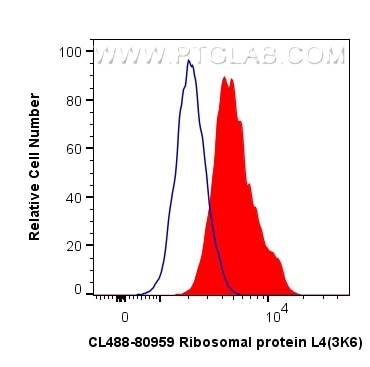CoraLite® Plus 488-conjugated Ribosomal protein L4 Recombinant antibody
Ribosomal protein L4 Recombinant Antibody for FC (Intra)
Host / Isotype
Rabbit / IgG
Reactivity
Human
Applications
FC (Intra)
Conjugate
CoraLite® Plus 488 Fluorescent Dye
CloneNo.
3K6
Cat no : CL488-80959
Synonyms
Validation Data Gallery
Tested Applications
| Positive FC detected in | HepG2 cells |
Recommended dilution
| Application | Dilution |
|---|---|
| Flow Cytometry (FC) | FC : 0.40 ug per 10^6 cells in a 100 µl suspension |
| Sample-dependent, check data in validation data gallery | |
Product Information
CL488-80959 targets Ribosomal protein L4 in FC (Intra) applications and shows reactivity with Human samples.
| Tested Reactivity | Human |
| Host / Isotype | Rabbit / IgG |
| Class | Recombinant |
| Type | Antibody |
| Immunogen | Ribosomal protein L4 fusion protein Ag28728 相同性解析による交差性が予測される生物種 |
| Full Name | ribosomal protein L4 |
| Calculated molecular weight | 48 kDa |
| Observed molecular weight | 48 kDa |
| GenBank accession number | BC009888 |
| Gene symbol | RPL4 |
| Gene ID (NCBI) | 6124 |
| Conjugate | CoraLite® Plus 488 Fluorescent Dye |
| Excitation/Emission maxima wavelengths | 493 nm / 522 nm |
| Form | Liquid |
| Purification Method | Protein A purification |
| Storage Buffer | PBS with 50% Glycerol, 0.05% Proclin300, 0.5% BSA, pH 7.3. |
| Storage Conditions | Store at -20°C. Avoid exposure to light. Stable for one year after shipment. Aliquoting is unnecessary for -20oC storage. |
Background Information
60S ribosomal protein L4 is encoded by RPL4 (or RPL1) gene. RPL4 is a component of 60S subunit of ribosome, and belongs to the L4E family. By interacting with c-Myb, RPL4 plays a important role in c-myc expression in response to growth factor and nutritional signals. Recently RPL4 was reported to be able to increase effeiciency of viral recoding sequence.
Protocols
| Product Specific Protocols | |
|---|---|
| FC protocol for CL Plus 488 Ribosomal protein L4 antibody CL488-80959 | Download protocol |
| Standard Protocols | |
|---|---|
| Click here to view our Standard Protocols |


